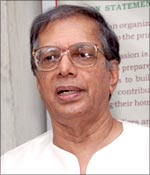|
|
| Help | |
| You are here: Rediff Home » India » News » Report |
|
 S C Chandrahasan | |||||
| Related Articles | |||||
|
•
Complete Coverage: Tsunami, the waves of destruction
| |||||
| |||||||||||||||||||||||
|
| |||||||||||||||||||||||
S C Chandrahasan started the Organization for Eelam Refugees Rehabilitation in 1984, a year after the ethnic war began in Sri Lanka [Images], when refugees started pouring into India. Tamil Nadu bore the brunt of this influx, as the Indian government tried its best to accommodate them. Neither the state nor the central government slacked in looking after the guests, even while their own citizens starved or committed suicide.
"We are grateful to the government and the people of India," says Chandrahasan, "that when you have millions of people living below the poverty line you still spare food for us. We are truly grateful."
Chandrahasan, a Sri Lankan Tamil, is the son of a politician, Samuel Selvanayagam, has been called the Lankan Gandhi. Chandrahasan started the non-governmental OFERR in the Tamil Nadu capital Chennai. OFERR now has branches outside every refugee camp in Tamil Nadu. There are over 100 such camps in the state.
OFERR receives funds from Indian government as well as NGOs round the world. Of OFERR's 675 full-time paid staff, 66 per cent are Lankan Tamils and 34 per cent are Indian Tamils. Its office in Egmore in Chennai is bustling with busy, polite people. Every minute they update the number of refugees in the state; the OFERR staff have the numbers on their finger tips, right down to the number of men, women and children.
OFERR enjoys good rapport with the Indian and the Tamil Nadu government. They have no ties with the Liberation Tigers of Tamil Eelam, but do come across the Tigers regularly in their line of work. Chandrahasan feels the ethnic problem in Sri Lanka can be only solved if the Indian government plays a proactive role and both the major political parties in Sri Lanka cooperate.
"When we come across the LTTE in our course of work among refugees, we try to impress upon them that violence will not succeed," he says. "What we need is democracy."
The main cause of the ethnic war in Sri Lanka is jobs. The Sri Lankan government employs only Sinhalese, and this has caused a lot of heartburn among the Tamils, who are on an average better educated.
The Mahinda Rajapakse government has aggravated the problem by trying to solve it militarily, says Chandrahasan. "After 24 years they still think that violence will solve the problem." He feels the South Asian Association for Regional Cooperation could play a mediating role, with India taking the lead.
"In the high seas between the two countries we come across the Sri Lankan Navy firing on Indian fishermen," Chandrahasan says. "The LTTE is present in that region. The refugees also use it to cross over. The Indian fishermen are caught in the crossfire between the Sri Lankan navy and the LTTE."
OFERR spends Rs 30 million among the refugees a year. They also work among tsunami victims along the Tamil Nadu coast, for which they spend Rs 20 million annually.
"One of the main reasons we are still working among tsunami victims is to say thank you to the locals and the Indian government," says Chandrahasan. "We can do better work than other NGOs among tsunami victims because we understand pain better than them.
"All we ask from the Tamil Nadu government," he continues, "apart from the food and housing they give the refugees, is a chance to educate our children."
OFERR helps the refugees feel at home when they arrive on Tamil Nadu's Rameswaram coast. The refugees first report to the nearest police station. The state police question the refugees before allowing them into camps. Well-off refugees come by air to Chennai and Thiruvananthapuram. They too have to report at the Mandapam refugee camp in Rameswaram. The address a refugee gives in Sri Lanka is verified by other refugees from the same area. OFERR, which acts as a bridge between the refugees and the officials, gets in touch with the refugees at the camps. The staff help the children get admission in a local school, they help the adults get jobs and they help the refugees find relatives and friends in other camps.
They conduct typing, basic computer awareness and tailoring classes for children who have completed 12th standard. They take refugees to hospitals inside the camps if they fall ill. If there is a serious problem they take them to the nearest government hospital.
Through OFERR offices in Sri Lanka they can help the refugees connect to families still back home and vice versa.
Photograph: Ganesh Nadar
|
|
| © 2007 Rediff.com India Limited. All Rights Reserved. Disclaimer | Feedback |